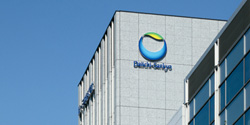 |
| Daiichi Sankyo's Tokyo, Japan headquarters--Courtesy of Daiichi Sankyo |
Daiichi Sankyo has been traveling a rocky road with its new-age anticoagulant Lixiana, but the company's load may be getting lighter. The Japanese pharma has tapped Merck ($MRK) to launch the drug in Europe, which could help Lixiana gain ground as it faces fierce rivalry from a trio of competitors.
Under the terms of the deal, Merck will have exclusive rights to market Lixiana in 13 European countries including Bulgaria, Croatia, Czech Republic, Denmark, Finland, Hungary, Poland and Romania. Daiichi doesn't have much of a presence in those countries, so the agreement with Merck "will contribute significantly" to the growth of the drug on the continent, the Tokyo-based company said in a statement.
And having "one of the biggest pharma companies in the world" by its side doesn't hurt, either, Daiichi said, as it tries to chart some growth for the med.
Merck also sees potential in Lixiana. The latest deal with Daiichi "broadens our existing cardiovascular portfolio and strengthens our ongoing commitment in this disease area," Merck spokeswoman Lainie Keller told FiercePharmaMarketing in an email. Plus, the drug "is a great fit to our current and future portfolio," Keller said.
"Because of this strong position and experience in cardiovascular treatments, partnering with (Daiichi) creates a perfect opportunity for Merck to bring this treatment to patients that had no access until now," Keller said. The company plans to roll out Lixiana in the 13 European countries starting in the second half of 2016.
A deal with Merck helps Daiichi as it tries to stay abreast of its anticoagulant competition. Lixiana entered the market behind Johnson & Johnson ($JNJ) and Bayer's Xarelto, Boehringer Ingelheim's Pradaxa, and Pfizer ($PFE) and Bristol-Myers Squibb's ($BMY) Eliquis, setting it back a bit as it competes for share.
Plus, not everyone is convinced about the drug's benefits relative to the other meds. "There is no unique advantage this drug offers relative to existing therapies. As such, clinical acceptability and marketability will pose a major challenge for this drug," Sanjay Kaul, who served on the FDA advisory panel that reviewed the med, said when Lixiana was approved in January 2015.
And some analysts are not optimistic about the drug's prospects. Cantor Fitzgerald analyst Emilia Falcetti sees the drug bringing in $200 million in fiscal 2019, setting it far behind sales figures for market leader Xarelto and silver medalist Pradaxa.
The less-than-stellar prediction comes as Daiichi prepares for the patent loss of its top seller Benicar. "The company is in a little bit of a tricky position at the moment," Falcetti told Bloomberg last year. "I can't see an obvious solution to their problem."
- read the statement (PDF)
Special Reports: Top 15 Drug Launch Superstars - Xarelto - Bayer and Johnson & Johnson | Top 10 drug brands by payments to doctors - Eliquis -Xarelto